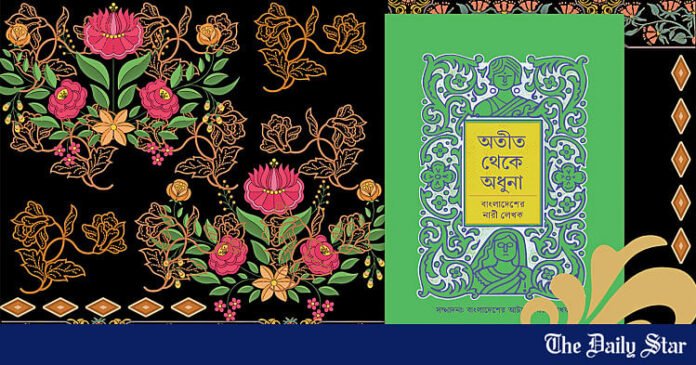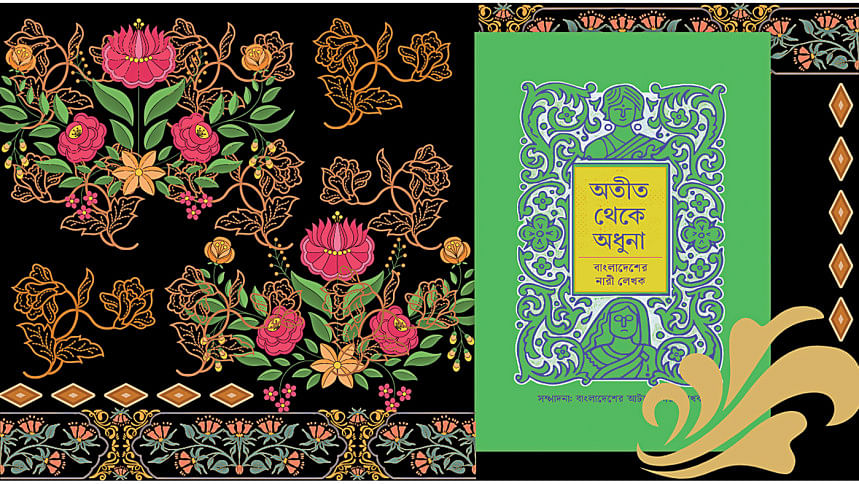Review of ‘Ateet Theke Adhuna: Women Writer of Bangladesh’ (Panjeree Publications Limited, 2024) edited by Niaz Zaman
ILLUSTRATION: MAISHA SYEDA
“>
ILLUSTRATION: MAISHA SYEDA
Aptly named Ateet Theke Adhuna: Bangladesher Naari Lekhok, this collection is unlike a conventional anthology. Starting with Rokeya Sakhawat Hossain, the list of writers includes an impressive 66 great authors. To imagine that such a large number of women who have written and have been writing in Bangladesh for 100 years has flown under the radar is indeed humbling and, frankly, disconcerting; I call acquiring knowledge of this unsettling matter because it sheds light on yet another glaring example of the age-long undermining of women’s capabilities. It is also sad to note that before these eight women, no man had considered paying homage to those who “once wrote”, and even those who “couldn’t speak up or write”. The dedication reads “To the women artists, both known and unknown, who once wrote, and to those who couldn’t speak up or write…”.
Traversing this veritable history of a 100 years of Bengali women’s writing, the book offers readers a much-needed look into the numerous trials that women, to begin with, have had to overcome to learn to read and write, let alone write to publish. With the overt expressions of patriarchy being rampant during the 80s, and mid-to-late 90s, women of those times had to fight tooth and nail to step out of their houses to demand and act to receive their basic right to education. Braving chastisements, threats of and eventual ostracisation, these 66 women relentlessly and single-mindedly pursued their dreams. The tribulations they suffered and the indignity that was freely doled out to them by the unfair norms and conventions designed by the patriarchy led them to make note of the injustices happening around them—to the weak, to the poor, and to the very country itself. This observation led them to include in their writing stories where the demeaned had voices that spoke not only for themselves but also for the nation they so dearly loved. And love the country they did (even though it had not done much in the way of making these women’s contributions widely known), as evidenced by their spontaneous and fearless participation both on the field and off it during the war for liberation. From writing fiery essays, invigorating poems and stories, to designing a plan to blow up the national power grid and hiding and ferrying arms to the freedom fighters, these women, even in the face of certain danger to their persons and their families, shed the demure persona and, in dismissal of societal norms, came to their motherland’s aid in whichever capacity they could.
Aside from the stories about biased traditions and characters whose lives mirrored their own, the fictional pieces created by these women also reflected the experiences of womanhood in all their variety. Narrated in an intimate tone, these stories explored the vast emotional range of women and delved deeply into their innermost feelings about love, loss, grief, and death. Some of the texts and poems also broke convention and portrayed women characters who were morally ambiguous and open about their needs and desires.
If this compilation shows that women can and will break through barriers to realise their dreams, then it also makes apparent that, in the journey to reach their goals, women need their support systems just as much as men do. In all these women writers’ backgrounds, the help and encouragement that these families have given them have stood out as common elements; if not for the staunch support that was unrestrainedly extended to them by a father, a mother, a brother, and/or a husband, their creative expressions would never have found their place on paper. In the current climate of gendered divisiveness, it was especially heartening to read about the gift of writing paraphernalia conspiratorially given by a brother to a sister; the morale-boosting declarations of approval made by a father to a daughter; and the loving espousal of and the eager prods to action initiated by a husband for his wife in their journey to bring their thoughts to life. The truth that none can exist as an island was further cemented by the inclusion of these facts about the writers having accepted the help that was offered to them by those closest to them.
This is an excerpt from the review. Find the full article on The Daily Star and Star Books and Literature’s websites.
Maeesha Wajid is a lecturer of English at Southeast University.






 For all latest news, follow The Daily Star’s Google News channel.
For all latest news, follow The Daily Star’s Google News channel. 

